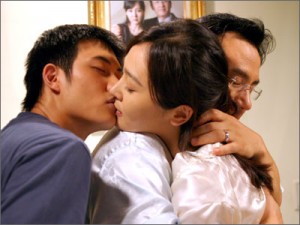3 – Iron: a series of visual haikus threaded into a perfect circle

delicate passion
![]()
3-Iron – Director KIM Ki-Duk
(BBC Prize-winning review)
Of all the words a film critic needs least, ‘exquisite’ must be near the top of the list. Yet this is precisely the word for this hauntingly beautiful film which celebrates with a rare delicacy and sensitivity – love, life and our freedom just to be.
Deeply cinematic, it draws us into the minds and hearts of the two chance lovers wordlessly, through image, situation and our own understanding of people, relationships and the randomness of many, often key, events in life. We don’t just watch their relationship, in a sense, without voyeurism, we share it. This consummate director invites you to read his characters and his movie. He spells nothing out. This is a chance meeting of two souls drawn together initially by tenderness and a respectful reticence which waits for love and passion to grow like a carefully tended young plant.
Paradoxically, in a film where every piece of dialogue seems like a compromise, the tag line of the movie is a thought expressed in words, which given their resonance by all that has gone before – brings tears of recognition to the eye.
A young college graduate breaks into houses of strangers who are away. Like a self-elected member of the family, house-sitting in their absence, he makes himself at home, tidies up, hand-washes any dirty clothes, fixes things, even photographs himself for a kind of imaginary family album. He treats the house and its contents with respect. Never taking anything, the house is left in a better state than when he broke in. Then he moves on to the next.
Unknown to him, he is watched going through this ritual occupation of her house by a distressed, abused wife whose husband has beaten her. Her fears allayed by secretly watching his respectful, harmless actions, she shows herself and then simply falls in with his rite of residence. Eventually after another violent confrontation with her husband in which the young man intervenes to protect her, the wife leaves on the back of his motorcycle with him. She now joins him in his curious progress through life, each occupation now seeming like two newly weds in their first home.
Discovery, confrontation with house owners and eventually jail on suspicion of the murder of an elderly occupant who has in fact died of cancer, adds tension and suspense to the light narrative thread that holds the film together. The police are bemused to find that these two young people respectfully and laboriously wrapped the body in accordance with what I take to be a traditional Korean burial practice, and gave him what a sympathetic policeman calls “as good a burial as any loving son would have provided.”
The 3-iron of the title is a visual metaphor that runs through the movie. Though incongruous, on one level at least, it functions as an image of the young man endlessly striving to perfect something for its own sake, not in pursuit of something else. A Zen-like ‘inner game’ if you will.
There is a stillness and spiritual quality about this film that anyone who saw KIM Ki-Duk’s Spring, Summer, Autumn, Winter will recognise, made all the more remarkable here by 3-Iron’s mundane urban setting. Some critics have been a little grudging about some aspects of this film. For me it is like a series of precise visual haiku’s threaded thematically into a perfect circle. In a word – exquisite. I guess I liked it.
(July 2005)
Filed under: *BBC Prize Reviews*, 5 stars, Drama, Europe/World cinema, General, Kim Ki-Duk, Philosophical, Romance

